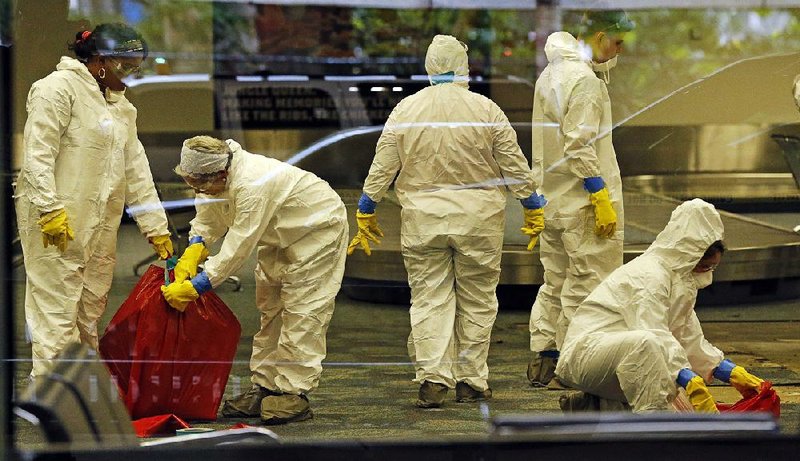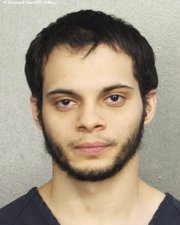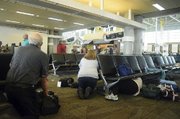FORT LAUDERDALE, Fla. -- The Iraq War veteran accused of killing five travelers and wounding six others at an international airport in Florida faces charges that carry a maximum punishment of execution, but the motive for Friday's gunfire remained unclear Saturday.
RELATED ARTICLE
http://www.arkansas…">Arkansan: At airport, silent daze, confusion
Esteban Santiago, 26, told investigators that he planned the attack and bought a one-way ticket to the Fort Lauderdale airport, a federal complaint said. Authorities said they don't know why he chose the airport as his target and have not ruled out terrorism as a motive.
Santiago was charged with an act of violence at an international airport resulting in death -- which, if he's convicted, could result in the death penalty. He also faces weapons charges.
"Today's charges represent the gravity of the situation and reflect the commitment of federal, state and local law enforcement personnel to continually protect the community and prosecute those who target our residents and visitors," U.S. Attorney Wifredo Ferrer said.
[INTERACTIVE: Airport map, traffic details, history of attacks]
Authorities said during a news conference Saturday afternoon that they had interviewed roughly 175 people in their investigation of the shooting. They described a lengthy interrogation of the cooperative suspect, a former National Guard soldier from Alaska.
The terminal where the shooting occurred remained closed Saturday. Flights at the airport had resumed.
Santiago opened fire with a Walther 9mm semi-automatic handgun that he had legally checked in his baggage on a flight from Alaska, the complaint said. He had two magazines of ammunition with him and emptied both of them, firing about 15 rounds, before he was arrested, the complaint said.
Investigators were scouring Santiago's electronics and digital media, officials said, trying to determine if he had any contact with Islamic State sympathizers and whether that motivated him to carry out the shooting.
"We have not identified any triggers that would have caused this attack. We're pursuing all angles on what prompted him to carry out this horrific attack," FBI agent George Piro said.
Broward County Sheriff Scott Israel said Saturday that six survivors were hospitalized with gunshot wounds, not the eight reported Friday. He said three of the victims were in intensive care Saturday. In addition, local officials said, dozens of people were treated for minor injuries that they suffered as they fled the shooting scene.
The shooting sent panicked people, many with baggage in hand, running out of the terminal and spilling onto the tarmac. Others hid in bathroom stalls or crouched outside behind cars, as police and paramedics rushed in to help the wounded and establish whether there were any other gunmen.
Mark Lea, 53, and his wife had just flown in from Minnesota when, he said, he heard three quick cracks, like a firecracker. Then came more cracks, and "I knew it was more than just a firecracker," he said.
After making sure his wife was safe outside, Lea went to help evacuate some older women who had fallen, he said. That's when he saw the shooter.
"He was just kind of randomly shooting people," he said. "If you were in his path, you were going to get shot. He was walking and shooting."
Suspect's past
Santiago was born in New Jersey and grew up in Puerto Rico, according to reports. He had been a resident of Alaska since 2014, where he lived with a girlfriend and their child. His family members in Puerto Rico said he had recently showed signs of serious mental illness.
"He said he heard certain voices, that the U.S. government wanted to enroll him in certain groups for ISIS, and he was very paranoid," an older brother, Bryan Santiago Ruiz, said in an interview Saturday from Penuelas, Puerto Rico. Ruiz had lived with Santiago in Anchorage from August to October.
"He said that the CIA controlled him through secret messages over the Internet and told him the things he had to do," his brother said.
While in Anchorage, there were other signs of trouble.
Esteban Santiago was charged in a domestic violence case in January 2016. He was accused of damaging a door as he forced his way into a bathroom at his girlfriend's Anchorage home. The woman told officers that he yelled at her to leave, choked her and smacked her on the side of the head, according to charging documents.
A month later, municipal prosecutors said he had violated the conditions of his release after officers found him at her home during a routine check. He told police that he had lived there since he was released from custody the previous month. His Anchorage attorney, Max Holmquist, declined Saturday to discuss his client.
Anchorage Police Chief Chris Tolley detailed other complaints of physical disturbances last year involving Santiago, but said officers either found no probable cause for arrest or were told by the city prosecutor not to arrest him.
Bryan Santiago said his brother had requested psychological help but barely received any.
"I told him to go to church or to seek professional help," he said.
Officials said that in November, Santiago walked into the FBI office in Anchorage, behaved erratically and asked for help.
"He was a walk-in complaint. This is something that happens at FBI offices around the country every day," FBI agent Marlin Ritzman said.
Afterward, Santiago was admitted for a time to a psychiatric facility. His brother said Santiago spent only a few days in the hospital. He questioned why the government did not hold Santiago longer or make sure he had no weapons. The brother said that as far as he knew, Santiago did not have any follow-up treatment, like medication or therapy, after his release from the hospital.
Santiago served in the National Guard, first in Puerto Rico and then in Alaska, and he was discharged from the Alaska Army National Guard for unsatisfactory performance in August. While with the Puerto Rico National Guard, he was deployed to Iraq for nine months in 2010 and 2011, and family members said he has shown signs of being mentally unwell ever since.
"He wasn't OK when he left there," his aunt, Maria Luisa Ruiz, said in an interview with Spanish-language television network Telemundo. "His father died, and that affected him even more."
His mother said Santiago had been tremendously affected by seeing a bomb explode next to two of his friends when he was around 18 years old while serving in Iraq.
Santiago's trip Friday took him from Anchorage to Minneapolis and then to Fort Lauderdale. Upon landing in Florida, investigators said, he collected his checked luggage, went into a bathroom, removed a gun from his bag, loaded it and then stepped out into the baggage claim area and randomly opened fire.
Witnesses said that after apparently running out of ammunition, Santiago sprawled spread-eagle on the floor. He was arrested and taken to jail for interrogation.
"The suspect did cooperate with the interview team, which was a joint, combined FBI-Broward [County] sheriff's office [operation]," Piro said. "The interview went over several hours and concluded sometime this morning," he said Saturday.
Law enforcement officials did not provide any details about the interview.
Santiago apparently acted alone, Piro said, and "the early indication is that there was no specific reason that he chose Fort Lauderdale International Airport, but we're still pursuing that and trying to really determine why he came here."
Santiago will have his first court appearance Monday.
Quiet and shy
Relatives and acquaintances in Puerto Rico described Santiago as quiet and shy. He was so reserved that in Penuelas, the small town where he lived most of his life, few people knew anything about him.
Workers at the barbershop, the bakery and the furniture store, and parishioners at the churches near his family's home said they did not know him or his family at all. At the police station, officers said they did not recognize him from the photo that has been shown repeatedly on network and cable TV since his arrest.
A neighbor of the family's, Carlos Cruz, who is in his 50s and has lived in the neighborhood all of his life, said he had spoken to Santiago only once.
Those who did say they knew him described him as highly intelligent, kind and very quiet.
Delia Candelario, who went to Josefa Velez Bauza High School with Santiago, said he played basketball with the best-behaved boys, the ones she considered a little nerdy, who always followed teachers' orders.
"He was the most peaceful of all of them," she said. "He participated in classes and all that, but he was pretty shy."
Jose Hernandez, who taught Santiago history at the school, said: "He was brilliant and did not show any indications of being disturbed. It's one of those strange cases. There are students who you expect mischief from, but not this one."
The Fort Lauderdale airport resumed operations Saturday, and thousands of passengers were looking for belongings they had dropped in the rush to escape the terminal the day before.
"Overnight the airport collected over 20,000 items -- luggage, cellphones, laptops, various personal items," said Mark Gale, airport director. "We are in the process of cataloging all of those items, protecting and securing it so we can get it back to its rightful owner."
Officials said they were working with government agencies and the Red Cross to get temporary identification and changes of clothing for people who left their things behind.
Information for this article was contributed by Lizette Alvarez, Frances Robles, Richard Perez-Pena, Carla Minet and Eli Rosenberg of The New York Times; by Sari Horwitz, Cleve R. Wootson Jr., Chico Harlan, Mark Berman, Matt Zapotosky and William Wan of The Washington Post; and by Kelli Kennedy, Curt Anderson, Tamara Lush, Danica Coto and Mark Thiessen of The Associated Press.
A Section on 01/08/2017



